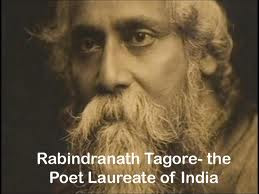Good morning/Good afternoon/Good evening my friends out
there! This is 11:00pm. 6th May, 2013, Monday in India. Hope you all
are doing well! Here is a too much hot weather in India and mangos are in there
way to ripe! I’m waiting for it!!
Well, friends; 9th May is a special day in India,
especially for West Bengal. This year Rabindra Jayanti has fallen in the day.
Ravindra Jayanti is the day which marks
the birth anniversary of Rabindra Nath Tagore and I think, I have no need to
say who he is! I want to share today about Rabindra Jayanti and little about
Rabindranath, Known as ‘Kabiguru’, too!
The great scholar, noble laureate and novelist Rabindranath
Tagore’s Birthday is celebrated on 25th day of the Bengali month Baisakh. In West
Bengal, it is popularly called ‘Poncheeshe Boishakh’ and is celebrated
ceremoniously and jauntiness all across the country. According to Gregorian calendar Rabindra Jayanti is
celebrated on 8th or 9th of May.
Rabindranath is remembered on this day and people pay on this day. The
celebration of Rabindra Jayanti is among the most important festivals for
people in Bengal. Cultural shows and poetry
recitations are organized throughout the city in the memory of the great poet-
Rabindranath. All cultural activities during the day are held at Jorasanko
Thakurbari. The birth place of Rabindranath. Music, skits, dramas, traditional
songs and dances are performed in institutes and theaters that are followed by
the distribution of awards.
 |
| Jorasanko Thakurbari |
Jorasanko Thakurbari and Rabindra Sadan is the main venue of
all cultural activities during Rabindra Jayanti in Kolkata. The celebration
continues from dawn to dusk. It is celebrated with equal fervor at
Shantiniketan, the university
started by Rabindranath Tagore.
Rabindranath Tagore was born in Calcutta in an affluent
Brahmin family at Jorasanko. Rabindranath was the youngest sibling of the
family. An eminent poet, visual artist,
playwright, novelist, and composer Rabindranath Tagore gave a new dimension to
Indian literature and music in late 19th and early 20th centuries. He became
Asia's first laureate winner of the most prestigious award Nobel Prize in1913.
Tagore wrote novels, short stories, songs, dance-dramas, and essays on
political and personal topics. His best works Gitanjali, Gora and Ghare-Baire
owed him worldwide acclaim. Tagore brought a cultural reform who modernized art
by strictly adhering to classical Indian forms. His composition ‘Jana Gana
Mana’ has been adopted as national anthem
of India and yet another great composition by him ‘Amar Shonar Bangla’ is
acclaimed the national anthem of Bangladesh. The lyrics of his songs have a
charm of their own and cast a spell
on everyone.
 |
| A painting by Rabindranath |
 |
| Rabindranath in his young age |
His works are an exclusive blend of Indian poetry and pious
theology. Tagore took his ideas of great scholarly works from the Vedas and
Upanishads. A soothing mixture of Indian classic music and popular folklore of
Bengal has been attributed to him and is called as Rabindra-Sangeet.




No comments:
Post a Comment